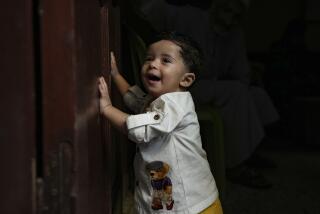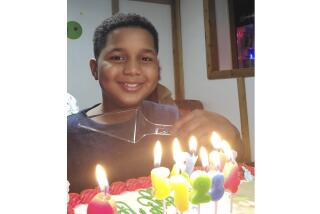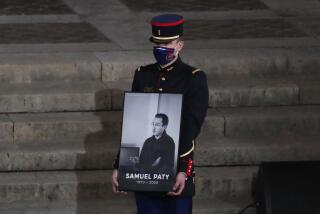Iraqi city struggles to understand student’s slaying
- Share via
Reporting from Najaf, Iraq, and Baghdad — The 14-year-old boy, Ali, had refused to give up his stationery to the teenage bullies, witnesses said, so the youths waited for him after school. They gripped pencils, protractors and rocks. Instead of just beating him up, they allegedly proceeded to kill him as dozens of classmates watched.
The slaying last month in the Shiite Muslim shrine city of Najaf has sent shockwaves through the devout community, as residents agonize over how the younger generation has been affected by both popular culture and the bloodshed that has defined Iraq since 2003.
“I wish he had died due to electrical shock, or a car killed him and that he had not passed away in this gruesome way,” said Ali’s father, Majid Hilo. “I found him dumped in the garbage! When I arrived there, nobody was there at all.... You could hear a needle drop where the area used to be so busy.”
Even now, Hilo seems in a daze as he describes what he was told happened by a student who claimed to have witnessed Ali’s killing:
It was Nov. 21, the first day of school after a Muslim holiday. Ali had been threatened by a school gang before the holiday when he refused to give them his notebooks. He was a classroom monitor and had stood up for other kids as well. The group, which took its inspiration from a Turkish miniseries about criminals, had terrified the class and people would speak of them only in whispers.
The bullies waited for him outside the school. At least five of them pounced on him.
Witnesses say that after the assailants pummeled him, someone announced that Ali was still alive, and they beat him some more.
“They had the will to kill him,” Hilo said. “Nobody tried to save him.”
A crowd of students gathered around and watched.
“They were chanting and encouraging them to hit him,” Hilo said. “One of the students who was there said that they were getting their courage from the other students chanting. They kicked him strongly even when he was a motionless corpse.”
A man who ran the neighborhood’s generator tried to revive Ali afterward but it was too late.
Shortly after, a student came to Hilo’s house and told him what had happened and gave him the names of the students who allegedly killed the teen. Hilo found his son’s body. No police officers or school guards showed up.
“I carried the corpse without anyone’s help,” Hilo said.
The next day, police arrived at the school and arrested four boys. The alleged ringleader, a 16-year-old, skipped school. When the police arrived at his house that night, they reportedly found him getting ready to leave for the southern city of Basra.
He had taken the nickname Kusofi, the protagonist of a Turkish television miniseries called “Bitter Life,” Hilo and local authorities said. In the show, Kusofi is an honest working class man who loses the love of his life to a big drug dealer. Kusofi decides to seek revenge and kills the dealer’s henchmen, but the rival escapes and Kusofi’s lost love commits suicide.
Hilo and others believe that Ali’s killers were influenced by the show.
“Those boys are imitating the episodes that glorify the gangs ... and attract the young people because of the love relationships and the beautiful actresses,” Hilo said. He complained that the authorities should have arrested five other youths in addition to those who have been detained and are under investigation. No charges have been filed.
The incident has caused serious reflection among Najaf’s establishment.
“Frankly, the phenomenon of violence in the schools exists and is spreading because of what the teenagers are watching on the television like the horror movies and episodes,” said Ismael Khalil Madhi, the general manager for education in the city.
The spokesman for the police department, 1st Lt. Muqdad Musawi, worries that the attack reflects the country’s strife as much as popular culture: “We must not forget the violence prevalent in the country.”
Special correspondent Fakhrildeen reported from Najaf and Times staff writer Salman from Baghdad. Times staff writer Ned Parker in Baghdad contributed to this report.
More to Read
Sign up for Essential California
The most important California stories and recommendations in your inbox every morning.
You may occasionally receive promotional content from the Los Angeles Times.










